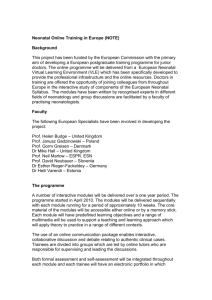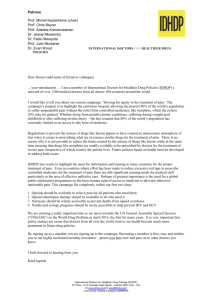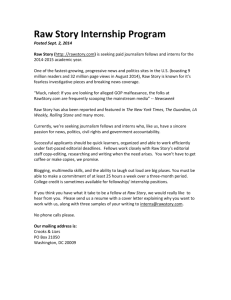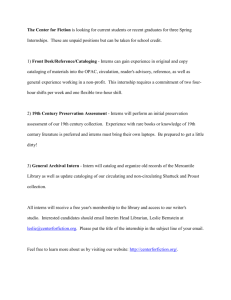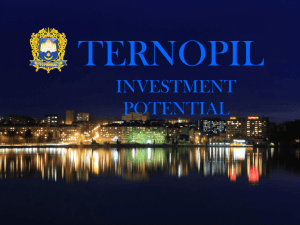Department of Therapeutics and Family Medicine of the Faculty of
advertisement
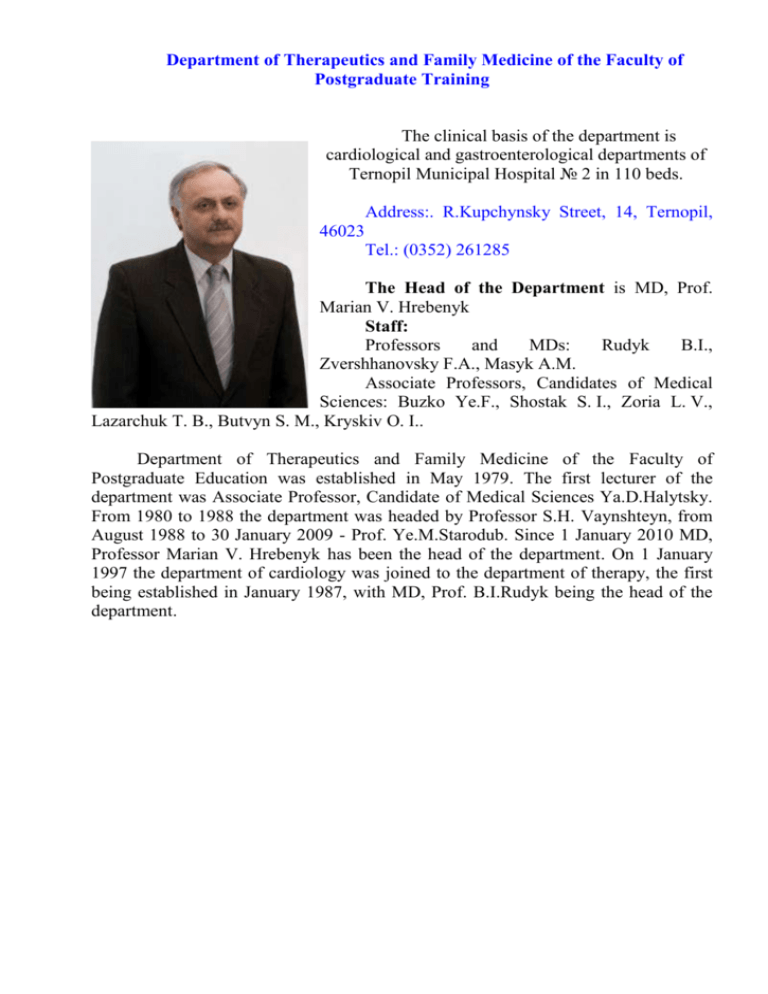
Department of Therapeutics and Family Medicine of the Faculty of Postgraduate Training The clinical basis of the department is cardiological and gastroenterological departments of Ternopil Municipal Hospital № 2 in 110 beds. Address:. R.Kupchynsky Street, 14, Ternopil, 46023 Tel.: (0352) 261285 The Head of the Department is MD, Prof. Marian V. Hrebenyk Staff: Professors and MDs: Rudyk B.I., Zvershhanovsky F.A., Masyk A.M. Associate Professors, Candidates of Medical Sciences: Buzko Ye.F., Shostak S. I., Zoria L. V., Lazarchuk T. B., Butvyn S. M., Kryskiv O. I.. Department of Therapeutics and Family Medicine of the Faculty of Postgraduate Education was established in May 1979. The first lecturer of the department was Associate Professor, Candidate of Medical Sciences Ya.D.Halytsky. From 1980 to 1988 the department was headed by Professor S.H. Vaynshteyn, from August 1988 to 30 January 2009 - Prof. Ye.M.Starodub. Since 1 January 2010 MD, Professor Marian V. Hrebenyk has been the head of the department. On 1 January 1997 the department of cardiology was joined to the department of therapy, the first being established in January 1987, with MD, Prof. B.I.Rudyk being the head of the department. Clinical basis of the department, Ternopil Municipal Hospital № 2 (cardiological and gastroenterological departments in 110 beds). Teaching staff of the department Education Doctors training is carried on the following cycles: 1. Precertification training in the specialties: - "Therapy"; - "General practice is family medicine"; - "Cardiology". - " Emergency medicine". Duration of cycles - 1 month. Cycles are carried out on self-financing basis. 2. Specialization for doctors in specialties: - "General practice is family medicine." Cycle duration – 6 months. - “Emergency medicine” Duration of cycle - 3 months. 3. Training of doctors-interns is performed at the stage of specialization free of charge or on the contract basis in specialties: - "Internal Medicine", 2 years (6 months - the first year and 5 months - the second the department of therapy and related departments (including 11 months - 1716 hours); at the bases of training - the first year - 5 months, the second year - 6 months (11 months totally); - "General practice – family medicine", 2 years (5 months at the university departments in the first i second years of study at full-time cecly; 6 months – as trainees (at correspondence cycle); - " Emergency medicine" 1.5 years. Educational plan for 2012 Discussion of syllabi with the curators of interns of different specialties Interns, who are at the full-time training cycle, conduct daily polyclinic conferences using multimedia facilities of the department. They report on the state of seriously ill patients in all departments of the clinic and on some interesting clinical cases. Resident doctors are also invited at such conferences where they can comment on the patient’s state, diagnostic and therapeutic measures, expected results, etc. This significantly improves the quality of teaching, develops clinical thinking, promotes studying and mastering the skills of healthcare providing. A young doctor is reporting at the morning policlinic conference. In the course of interns and course visitors teaching the following facilities are used: computer test programs for training and assessment, academic fund of compact disks on different branches of therapy, information from the Internet, library funds of Ternopil State Medical University and Ternopil Regional Medical Library. Interns, working at test control laboratory The work of the department has several components. One of the most important is a therapeutic work. It reflects the professional level of each doctor and describes potential opportunities of the clinical department. Therapy mastery improves for years. The higher the qualification category of a physician and teacher is, the more the intern can pick up. The very name of the Faculty of Postgraduate Education requires its providing with highly qualified teachers and doctors. Therapeutic work of each instructor of the department consists of rounds, consultations in the hospital departments, consulting hours in the polyclinic, patients’ supervision (for the department assistants) and urgent duties. Prospects for clinical work is closely connected with the improvement of technical providing of the department, introducing new methods of diagnosis and treatment, including invasive technologies in cardiology. Lecturers of the department specialize in different branches: they are cardiologists, gastroenterologists, pulmonologists, phthisiologists, pediatricians and functionalists. They can provide consultations in a wide range of areas. The interns and course visitors have the opportunity to study all the modern methods of diagnosis of the various diseases. Professors Rudyk B.I., Hrebenyk M.V. and resident doctors are discussing clinical situation in cardiology department of Ternopil Municipal Hospital № 2. According to modern requirements, training of interns in specialty "General practice and family medicine" should be as close to the practical work of doctors in rural areas as it is possible. For this purpose, on the initiative of the TSMU administration five Educational-Scientific Centres of the first medical-sanitary aid have been established at the rural clinics. In order to encourage young professionals to work in rural areas all these centres are well equipped, thus creating a comfortable environment to live and work. They are also provided with laboratory analysis and diagnostic equipment. Teams of interns (2 interns in specialty "General practice and family medicine" and 2 dentists) work at the centres during a week. Under the supervision of the teacher interns perform their professional duties. Curators of the specialization cycles in "General practice – family medicine" are planning interns’ visits to Educational-Scientific Centres of the first medicalsanitary aid. Research The priority aspect of the department scientific work is the development and study of modern methods of diagnostics and treatment of cardiovascular and gastrointestinal diseases. Two doctoral theses are being worked on at the department. Manuals "Diseases of the digestive organs”, "Lectures in cardiology", "Algorithms for diagnosis and treatment of emergency conditions in therapeutic practice", "Fundamentals of practical electrocardiography", "Fundamentals of clinical medicine", " Ankylosing spondylitis (Bekhterev's disease)", " Pulmonology in the practice of family doctor”, educational CD " Diseases of the digestive organs", more than 500 printed works have been published by the department. The department staff also makes reports at international, Ukrainian and regional scientific conferences. The department staff exchanges the experience with the instructors of other institutions at the All-Ukrainian scientific-research conference "New aspects of credit-modular system introduction in higher medical and pharmaceutical establishments of the III-IV accreditation levels of Ukraine" in educationalrecreational complex “Chervona Kalyna”. Clinical work The Department of Therapy and Family Medicine is based on cardiological and gastroenterological departments of Ternopil Municipal Hospital № 2. In 2007-2009, the head of the department of family medicine and therapy was MD, Prof. Starodub Ye.M.. Prof. Starodub Ye.M. is performing rounds. From 2010 till the present moment the department has been headed by MD, Prof. Hrebenyk M.V.. It was Professor Hrebenyk M. who established a computer database of patients with myocardial infarction, systemic thrombolysis and atrial fibrillation, which allowed to analyze the level of emergency aid for cardiac patients and optimize it. All teachers of the department have higher certification category in therapy and they are highly qualified specialists. In 2007-2011 the following innovative technologies were implemented in practice by the department staff: 1. Assessment of life quality of patients with cirrhosis (Prof. Samohalska O.Ye.) 2. Assessment of risk of sudden death in patients with cirrhosis (Prof. Samohalska O.Ye., Lobanets N.V.); 3. Optimization of antihypertensive therapy schemes in patients with hypertension depending on the bone mineral density (Professor N.I. Yarema); 4. Determination of elastase levels in liver cirrhosis of different etiology (Prof. Starodub E.M., Prof. Samohalska O.Ye., Assoc. Prof. Lazarchuk T.B., Babyak O.V.); 5. Determining the level of leptin in liver cirrhosis (Prof. Samohalska O.Ye., Assoc. Prof. Lazarchuk T.B.); 6. Determination of Doppler parameters of hepatic circulation for prediction of portal hypertension complications (Prof. Samohalska O.Ye., Lobanets N.V.); 7. Method aimed at decreasing the number of manifestations of postinfarction heart remodeling in patients with chronic bronchial obstruction (Prof. Hrebenyk M.V.). Clinical work of each teacher of the department consists of rounds, consultations in hospital and policlinics, and urgent duties. In 2010, clinical work of the department was expanded by regular visits to the village Zarubynci (Zbarazh district) and village Hnylytsi (Pidvolochysk district) in Ternopil region, where the Educational-Scientific Centres of the first medicalsanitary aid to rural population were established. For the first time in Ukraine this type of medical and educational work was initiated by TSMU. Associate Professors visit the villages mentioned above and check the way teams of interns and doctors fulfill regular curriculum and conduct consultative work. Every teacher examines 3-4 patients, appoints diagnostics and treatment. These consultations are a good method of sharing experience with future doctors. More than 120 patients have been examined in the villages by the department staff. Associate Professor Zoria L.V. is the curator of this important part of students practical training, she forms students teams, tries to improve the quality of interns training and regularly monitors their work. Assoc. Prof. Zoria L.V. in Educational-Scientific Centre of the village Hnylytsi Clinical and educational works of the department are closely related. Each teacher strives to share their experience with future doctors. Daily clinical conferences with multimedia presentations are a good way of full-time training cycle (picture 5. Interns Clinical Conference). At these conferences, young doctors report on the state of seriously ill patients and conduct clinical analysis of the patient. This improves the quality of teaching and develops clinical thinking. One of the department’s achievements is that for 20 years MD, Prof. Rudyk B. has been the head of Ternopil Regional Society of Therapeutists. Each year, under his supervision 4 society meetings are held, where the most actual issues of modern medicine are discussed. Future prospects of the clinical work are closely connected with the improvement of clinical facilities of the department, implementation of new methods of diagnosis and treatment, including pharmacoinvasive technologies in cardiology. Among the lecturers are cardiologists, gastroenterologists, pulmonologists, tuberculosis specialists, pediatricians and specialists in functional diagnostics. They provide consultations in these areas, performing an ultrasound diagnostics, pHmetrication, bronchoscopy. Consultations in clinics as demonstrative lessons for interns are one of the most perspective forms of training.

